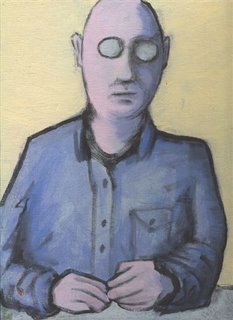Saturday, May 06, 2006
unmasking plato and socrates
One of the things I'm intrigueed by is philosophy. How do things work, what do people believe, why do they think that, and what are the implications of those ideas? Probably even more interested than I thought, as I discovered when I was in college and after just taking the classes that intrigued me for a while found myself with a BA in Philosophy.
While at the library the other day (we've got an excellent library in this town), cruising the stacks for somthing new to read, I stumbled across a book called Plato Unmasked by Keith Quincy. The author teaches philosophy and has condensed all of Plato's dialogues to what he considers their essentials. Quncy says that this is the only course he teaches which he's had to break up a fist-fight among students. He also includes their fictional context as well as the historical.
Now Socrates is the grand old man of western philosophy, considered a good man, a wise man, a sort of comic figure really whose story becomes tragic when he is unjustly executed by the citizens of Athens for his relentless search for Truth (which makes them uncomfortable). Most of what we know about Socrates comes from either his critics or from his student Plato, because he himself did not write out anything defining his own method or conclusions.
Plato often catches heat for his infatuation of the rival city-state Sparta, which was a stark contrast to the democracy of Athens. Sparta was a city that was more a military camp than a city, with roving squads of death squads terrorizing the lower caste. Meanwhile Athens was a commercial and cultural magnet for the whole region. One wonders why Plato didn't abandon the Athens he despised for the Sparta he praised so lavishly?
But the reservations many hold toward Plato because of this does not rub off on Socrates, who Plato uses as a mouth-piece for that uncritical admiration. Loveable, roly-poly Socrates can't be a bad man. But Athens hardly knew the nest of vipers its open society fostered.
In this historical context, Socrates is not the benign and wise figure Plato makes him out to be. Throughout the book the author points up the many places in the dialogues where the anti-democratic ideas are shown in a favorable light while the defenders of democracy are smeared and belittled. It seems the tactics of today's politicians have a long history to the very dawn of recorded history.
In fact, many of Socrates's students conspired against democratic Athens in favor of fascistic Sparta (or at least remaking Athens along the lines of the Spartan model). Opponents to the takeover were killed by the hundreds, many more went into exile. The famous Spartan army was called in to help suppress Athenian resistance to the coup. Socrates himself was recruited to help murder his fellow citizens.
Conspiracy, murder, betrayal, revolution, assassination-- who knew Greek philosophy could get so juicy? Reading the book makes me realize that philosophy cannot be understood without the political context that nourishes it.
While at the library the other day (we've got an excellent library in this town), cruising the stacks for somthing new to read, I stumbled across a book called Plato Unmasked by Keith Quincy. The author teaches philosophy and has condensed all of Plato's dialogues to what he considers their essentials. Quncy says that this is the only course he teaches which he's had to break up a fist-fight among students. He also includes their fictional context as well as the historical.
Now Socrates is the grand old man of western philosophy, considered a good man, a wise man, a sort of comic figure really whose story becomes tragic when he is unjustly executed by the citizens of Athens for his relentless search for Truth (which makes them uncomfortable). Most of what we know about Socrates comes from either his critics or from his student Plato, because he himself did not write out anything defining his own method or conclusions.
Plato often catches heat for his infatuation of the rival city-state Sparta, which was a stark contrast to the democracy of Athens. Sparta was a city that was more a military camp than a city, with roving squads of death squads terrorizing the lower caste. Meanwhile Athens was a commercial and cultural magnet for the whole region. One wonders why Plato didn't abandon the Athens he despised for the Sparta he praised so lavishly?
But the reservations many hold toward Plato because of this does not rub off on Socrates, who Plato uses as a mouth-piece for that uncritical admiration. Loveable, roly-poly Socrates can't be a bad man. But Athens hardly knew the nest of vipers its open society fostered.
In this historical context, Socrates is not the benign and wise figure Plato makes him out to be. Throughout the book the author points up the many places in the dialogues where the anti-democratic ideas are shown in a favorable light while the defenders of democracy are smeared and belittled. It seems the tactics of today's politicians have a long history to the very dawn of recorded history.
In fact, many of Socrates's students conspired against democratic Athens in favor of fascistic Sparta (or at least remaking Athens along the lines of the Spartan model). Opponents to the takeover were killed by the hundreds, many more went into exile. The famous Spartan army was called in to help suppress Athenian resistance to the coup. Socrates himself was recruited to help murder his fellow citizens.
Conspiracy, murder, betrayal, revolution, assassination-- who knew Greek philosophy could get so juicy? Reading the book makes me realize that philosophy cannot be understood without the political context that nourishes it.

